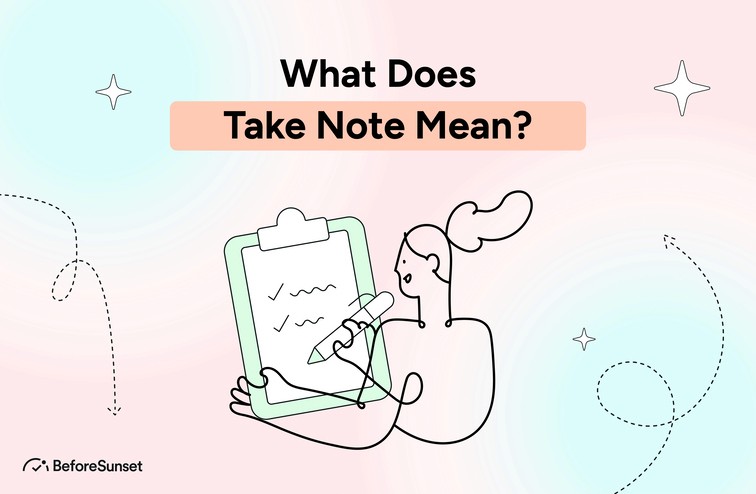Productivity is a key component of success in today's fast-paced world, both personally and professionally.
It's simple to get overwhelmed and forget critical nuances when there are so many things to juggle and learn.
The simple act of taking notes can have a big impact on that situation.
Taking notes is a useful tool that can increase productivity by enabling better organization, memory retention, and attention.
Taking notes can help you keep on top of your workload and accomplish your goals, whether you're a busy professional, student, or anybody trying to increase their productivity.
In this blog, we'll go into more detail on the value of taking notes for productivity, look at different note-taking techniques, and offer tips on how to get the most out of note-taking for productivity.
But before we start, have you ever tried taking notes with BeforeSunset AI?
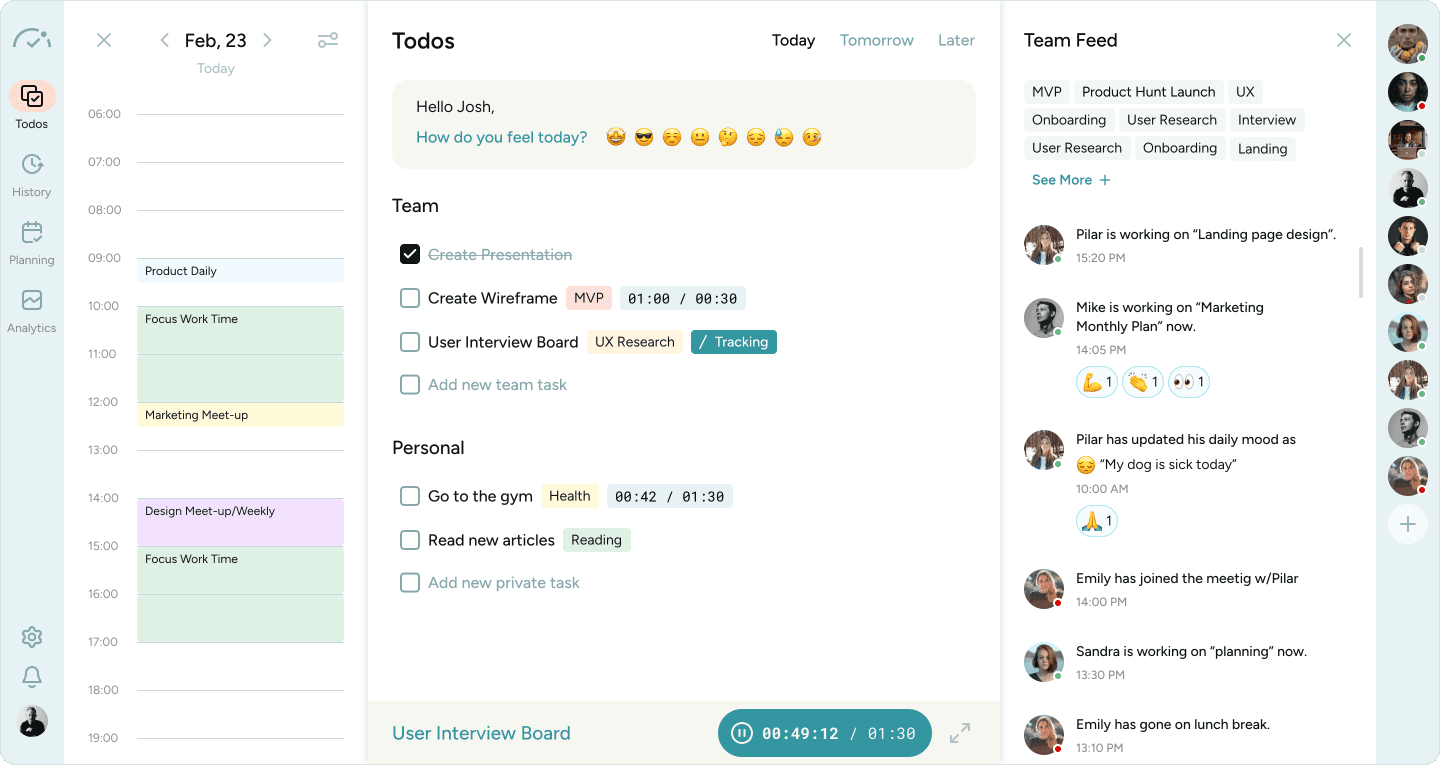
What Does Take Note Mean?
Writing down ideas or information as they occur to you is the act of taking notes.
It is a useful tool for enhancing organization, memory, and productivity.
Pen and paper, digital notes, and audio recordings are all acceptable methods of taking notes.
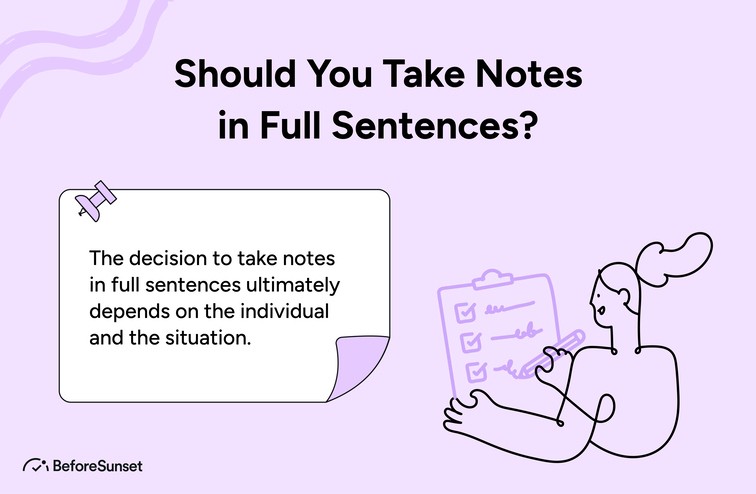
Should You Take Notes in Full Sentences?
It depends on your personal note-taking technique and the aim of your notes as to whether you should take notes in full sentences or not.
For some people, taking notes in full sentences may be advantageous since it captures more context and detail, which is good for remembering information and referring to it later.
Others, however, might find that taking notes in the style of bullet points or brief phrases is more useful for organizing information and summarizing important ideas.
It's also critical to think about the kind of information you're recording.
To accurately record the speaker's message when taking notes during a lecture or presentation, whole sentences may be required.
However, bullet points may be more suitable for detailing ideas and activities if you're taking notes on a project or brainstorming session.
Finding a note-taking method that suits you and keeps you organized, productive, and focused is the key.
And you wouldn't want to lose time, right? Because time management is the key to success.
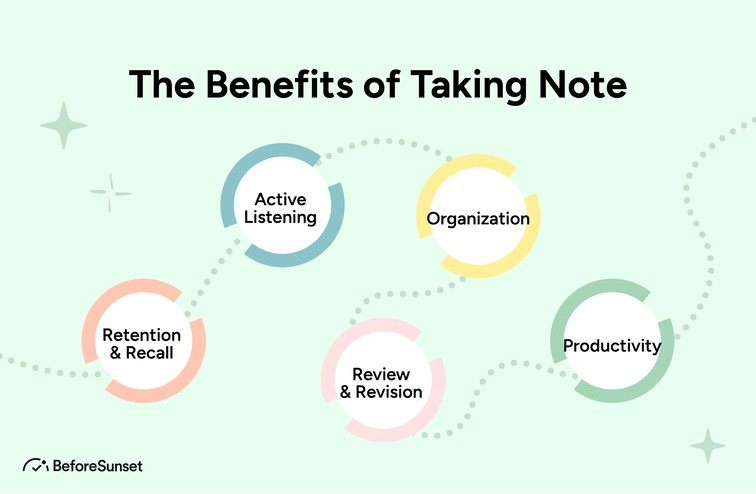
The Benefits of Taking Note
The science behind taking notes
Taking notes has been proven to increase memory retention.
Writing down knowledge aids in retaining it in our memory.
Writing activates the brain and improves our ability to recall knowledge so that you could make the most of your day!
How Taking Notes Can Improve Memory Retention
Improved Memory Retention
We can learn and remember more information if we take notes.
It helps to reinforce what we've learned and makes it simpler to recall when we go back and check our notes later.
Taking notes can also assist us in finding connections and patterns in the information we are learning, which will enhance our comprehension and memory.
Increased Focus
During meetings, lectures, or other activities, taking notes might aid in maintaining our attention and interest.
We are more likely to pay attention and retain information when we are actively taking notes.
Taking notes also aids in avoiding detours and maintaining focus.
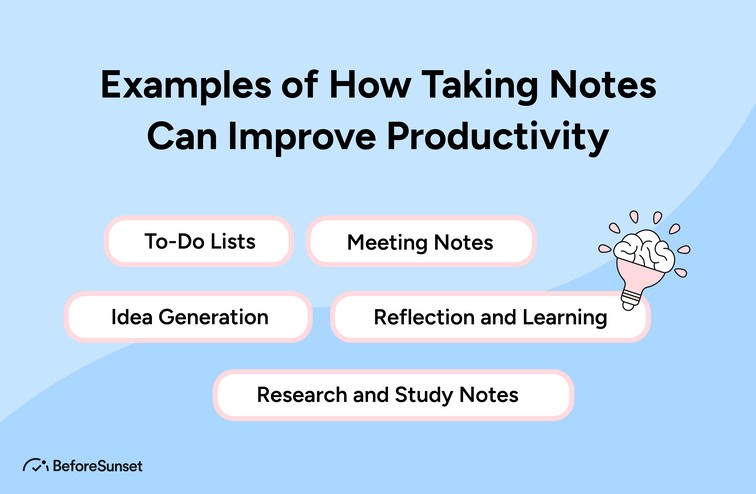
Examples of How Taking Notes Can Improve Productivity
In many ways, taking notes can increase productivity.
It can, for instance, assist us in maintaining organization and control over our workload, setting priorities for our work, and avoiding wasting time on trivial pursuits.
We can operate more productively and successfully if we maintain our attention and interest.
Better Organization
Taking notes is a crucial organizational technique.
We may manage our ideas, tasks, and projects by capturing information in a systematic manner.
This can assist us in keeping track of deadlines, avoiding forgetting crucial information, and locating areas that require our attention.
And doing this is really simple! You can use BeforeSunset AI to take notes as you go over each task.
This way your notes will be organized and stored so you can check them again whenever you like.
Tools and Techniques for Effective Note-Taking and Organization
Effective note-taking and organization can be achieved using a wide variety of tools and methods.
Pen and paper are preferred by certain people, while digital tools are preferred by others.
The most important thing here is creating a system that works for you, no matter what your preference.
This could entail giving your notes a structure, highlighting significant information with color or symbols, or using software tools to keep track of your chores and notes.
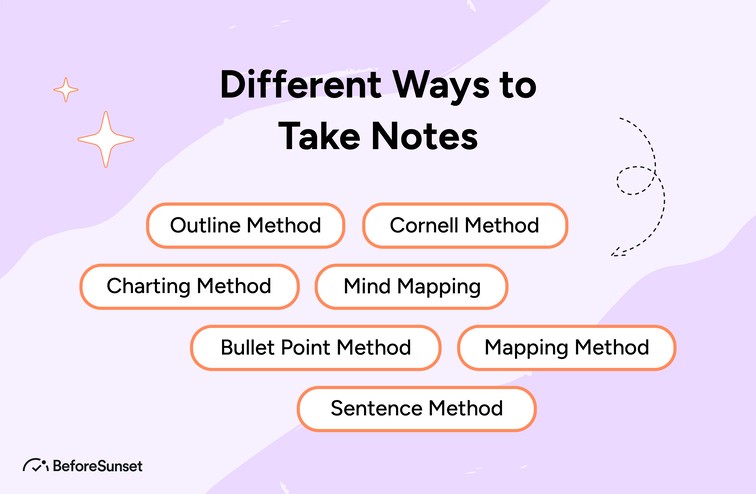
Different Ways to Take Notes
Being productive requires that you take notes.
How you do it depends on you and your preferences.
There are many various ways to take notes, and each has benefits and downsides of its own.
The traditional way of taking notes on paper and on a computer will both be covered in this section.
Traditional Pen and Paper Method
For generations, people have taken notes using the conventional pen-and-paper approach.
You just use a pen or pencil to jot down information on paper.
This approach still offers numerous benefits, even though it can seem dated.
However, it may be hard to immediately find what you’re looking for since you can’t really use shortcuts like ctrl+F or command+F, for that matter.
So you might want to switch to a digital option.
Benefits and Drawbacks of Using Pen and Paper for Note-Taking
Taking notes on paper with a pen allows for more flexibility and creativity, which is one of its advantages.
Your thoughts can be written down, sketched, or drawn with a pen and paper, which is useful for brainstorming sessions or creative undertakings.
Additionally, pen and paper don't need a battery or an internet connection, so it's a dependable choice.
As we’ve stated before, organizing and finding information later can be challenging, which is one disadvantage of taking notes on paper and with a pen.
Notes are also easy to lose or misplace, which may be annoying and time-consuming.
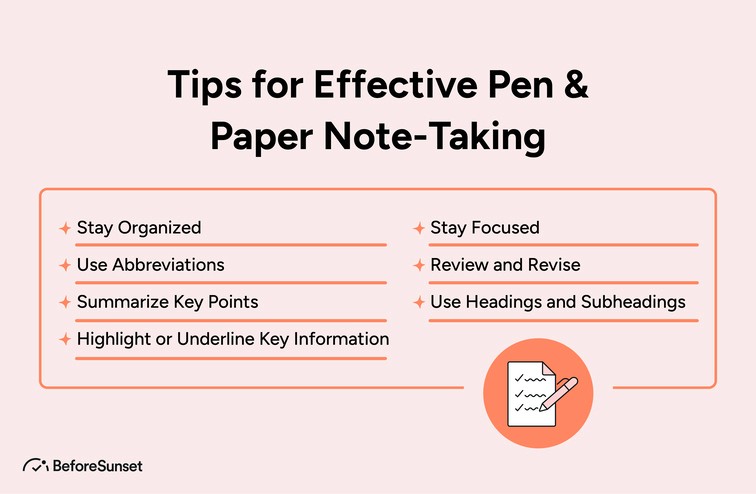
Tips for Effective Pen and Paper Note-Taking
There are some suggestions you can use to improve note-taking if you choose to employ the conventional pen and paper method.
Use acronyms or shorthand first to save time and space.
Arrange your notes using headings and subheadings.
Regularly check your notes to help your memory.
Digital Note-Taking Methods
With digital note-taking methods, information is captured and organized utilizing technology.
For taking notes digitally, there are numerous tools and programs available, each with unique benefits.
The advantages of digital note-taking methods
The possibility of better organization and searchability is one benefit of digital note-taking techniques.
To get the information you need fast, you can effortlessly tag, organize, and search for notes using digital tools.
The ability to collaborate and share notes digitally is another benefit that makes them useful for group tasks.
Examples of Popular Digital Note-Taking Tools and Software
Digital note-taking software and tools come in a wide variety.
Some of the options are:
Evernote
OneNote
Google Keep
Apple Notes
The critical thing to remember here is to select a tool that meets your particular demands because each of these products has unique features and benefits.
Tips for using digital note-taking methods effectively
The usage of digital note-taking techniques can be more productive if you follow a few guidelines.
In order to save time and maintain uniformity, start by using templates or pre-made outlines.
You can always use tags and categories to arrange your notes.
Periodically back up your notes to make sure you don't lose crucial information.
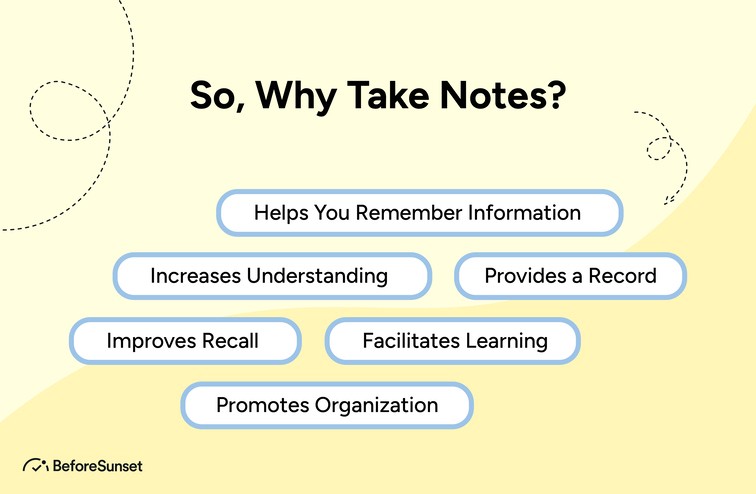
So, Why Take Notes?
In conclusion, taking notes is a straightforward but effective productivity strategy that can significantly affect our capacity to remain focused, organized, and effective.
It can assist us in achieving our objectives and succeeding in both our personal and professional efforts by enhancing memory recall, facilitating better organization, and encouraging enhanced focus.
There are also several note-taking choices available to fit individual preferences and needs, whether you prefer conventional pen and paper methods or contemporary digital tools.
And since being productive requires taking notes, why not make it easier for yourself?
BeforeSunset AI allows you to take notes however you like, and the good thing is that your notes will stay organized.
You can take notes on your assignments, projects, and even personal tasks.
You can take as many notes as you like.
You also don’t have to look for your notebook everywhere.
Or even if you find it, there’s no need to look for that certain page anymore.
You just have to take note and make the most of every opportunity to boost your productivity and achieve your goals.

